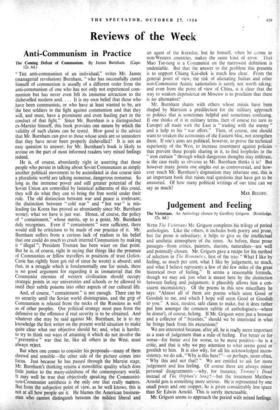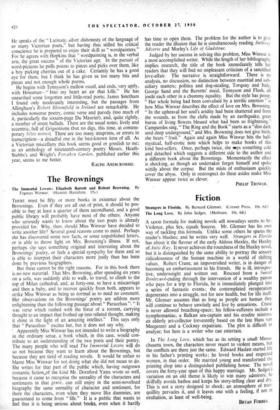Judgement and Feeling
WITH The Victorians Mr. Grigson completes his trilogy of period anthologies. Like the others, it includes both poetry and prose, but the prose is subsidiary; it helps to give us the intellectual and aesthetic atmosphere of the times. As before, these prose passages—from critics, painters, diarists, naturalists—are well and pointedly chosen. Mr. Grigson gave a recipe for his method of selection in The Romantics, first of the trio: " What I like by feeling, so much per cent, what I like by judgement, so much, and what I believe represents a few of the few miles of the great historical river of feeling." It seems a reasonable formula, though we may ask just what is meant here by the distinction between feeling and judgement; it plausibly allows him a con- sistent inconsistency. Of the poems in this new miscellany he says: "Almost all of them are poems which seem Good or Goodish to me, and which I hope will seem Good or Goodish to you." A nice, modest, safe claim to make, but it does rather put him amongst the common rabble of anthologisers—where he doesn't, of course, belong. If Mr. Grigson were just a browser and a collector of " beauties," should we be interested in what he brings back from his excursions?
We are interested because, after.all, he is really more important as a man of judgement than a man of feeling. For better or for worse—for better and for worse, to be more positive—he is a critic, and that is why we pay attention to what seems good or goodish to him. It is also why, for all his acknowledged incon- sistency, we do ask, "Why is this here?"—or perhaps, more often, " Why this and not that? " We are entitled to ask for more judgement and less feeling. Of course there are always-minor personal disagreements —why, for instance, Tommy's Dead instead of The Orphan's Song?—but the treatment Matthew Arnold gets is something more serious. He is represented by one small poem and one snippet; he is given considerably less space than Sir Edwin Arnold. This is surely inexcusable.
Mr. Grigson seems to approach the period with mixed feelings. He speaks of the " Latinate, silver dishonesty of the language of so many Victorian poets," but having thus stilled his critical conscience he is prepared to enjoy their skill as " wordpainters." For he agrees with Hopkins that " wordpainting is, in the verbal arts, the great success " of the Victorian age. In the pursuit of word-pictures he pulls poems to pieces and picks over them, like a boy picking cherries out of a cake. Certainly he has a good eye for them, but I think he has given us too many bits and pieces and not enough whole poems. He begins with Tennyson's mellow ouzel, and ends, very aptly, with Housman—" Into my heart an air that kills." He has unearthed some forgotten and little-read poets; James Smetham I found only moderately interesting, but the passages from Allingham's Robert Bloomfield in Ireland are remarkable. He includes nonsense poetry, comic verse and parody (too much of it, partictilarly the sixteen-page Du Maurier), and, quite rightly, a number of street ballads. There are the usual notes; lively and eccentric, full of Grigsonisms (but no digs, this time, at contem- porary bites noires). There are too many misprints, or errors in transcription—a dreadful one in the best-known item of all. As a Victorian miscellany this book seems good or goodish to me; as an anthology of nineteenth-century poetry Messrs. Heath- Stubbs's and Wright's Forsaken Garden, published earlier this year, seems to me better.
RALPH ABERCROMBIE.



















 Previous page
Previous page